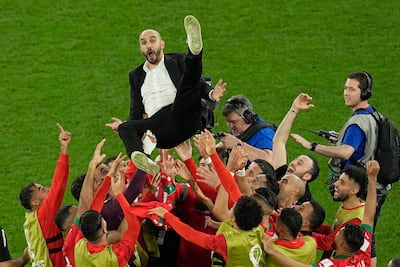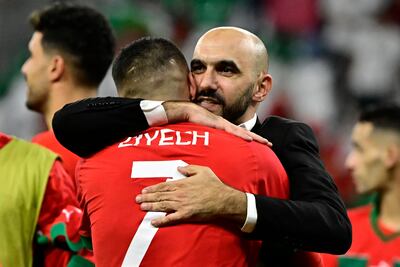Penalty shoot-outs test the nerves of even the coolest football coach. Walid Regragui, the manager of Morocco attracting global admiration at the World Cup for his leadership, intelligence, clarity and patience, would acknowledge that.
Barely four months ago, he had to oversee a high-stakes shoot-out having just been banished from the touchline.
He had been shown a red card in the final moments of extra time in a tense Moroccan Cup final where his then club, Casablanca’s Wydad, were being held to a draw by Berkane.
Regragui lost his temper, hurling a water bottle in the direction of a counter-attacking Berkane player. His players promptly lost their nerves in the penalties, defeated, denied a treble from a dazzling season, as their inspirational and momentarily emotional coach prepared to leave the job to take charge of the national team.
Regragui’s conduct and authority ahead of his next penalty shoot-out would be utterly distinct.
This time, on Tuesday night in Al-Rayyan, he was counting down the most significant minutes of his career, perhaps the most important seconds in the history of Moroccan football or of any Mena country at a World Cup.
He kept his cool, as did his impeccably marshalled team, after two goalless hours against Spain, even when the Spanish substitute Pablo Sarabia skimmed a shot, in stoppage time, off the Moroccan goalpost.
Regragui simply held his breath, turned his thoughts to guiding his players through the concentrated individual pressures that would follow.
He soothed the anxieties of his first penalty-taker, Abdelhamid Sabiri, one of the footballers freshly persuaded, during Regragui’s three-and-half month term so far as Morocco manager, to commit to the national team ahead of Germany, where Sabiri grew up and whose under-21s he has played for.
He gently encouraged Hakim Ziyech, the superstar whom Regragui in September convinced to rescind his retirement from international football.
Morocco v Spain ratings
By the time that pair had scored the first two penalties, and Spain failed with theirs, Morocco were on their way to putting the country in a World Cup quarter-final for the very first time. They became the first Arab nation to reach the last eight.
They had put an African country coached by an African in the last eight for the first time, too, one of the many landmarks set by Regragui, 47, in an extraordinary few months.
He guided Wydad to the African Champions League title in May. He sealed the Moroccan league in June, and well before his hot-tempered moment in the domestic Cup final in Rabat, his sweep of club titles looked like a moment of serendipity for his country.
Within the national team, who qualified for Qatar 2022 under the experienced Bosnian coach Vahid Halilhodzic, there were problems, notably the exclusion of key players because of fractious relationships with Halilhodzic.
Regragui was the solution.
First, he cured the Ziyech issue. The mercurial Chelsea winger had fallen out with Halilhodzic in the summer 2021, his attitude and professionalism publicly criticised. Regragui brought about a rapprochement.
If it was not quite a condition of Regragui’s appointment that Ziyech, a potential match-winner of high-class pedigree, be persuaded to return, that Ziyech did was an instant recommendation that this articulate, confident man-manager was an excellent communicator; flexible, a listener.

He is in tune with players’ experiences. Regragui was once just like them. He had a distinguished playing career with the national team, a studious full-back who was part of the most successful Moroccan Africa Cup of Nations campaign in any current player’s lifetime, when the Atlas Lions reached the 2004 final, losing 2-1 to hosts Tunisia.
Regragui’s through-ball set up the equaliser in the final; he was a dynamic influence up and down the right flank.
He was, even then, a coach-in-waiting, according to Rolland Courbis, who was Regragui’s coach at the French club Ajaccio in the early 2000s.
“He was interested in every aspect of the job: tactics, man-management, understanding the mind,” Courbis told the French newspaper Liberation. He was an intrepid professional, broadening his experience by playing in Spain’s top division, for Racing Santander, in between contracts with several French clubs.
He was born in France, to Moroccan parents, a dual heritage he shares with a majority of those he now instructs.
Ziyech was born in the Netherlands; Sabiri grew up in Germany; Achraf Hakimi, scorer of the impudent, clinching penalty against Spain, was born in the suburbs of Madrid, and, in many cases, his players have confronted a choice of whether to play for Morocco or their European nations.

Regragui, in his polished press conferences, makes a point of emphasising the strength of commitment involved in those choices and that he considers the diversity of background in his squad as a virtue.
“He sticks up for his players and that gives you the desire to battle for him,” said the defender Nayef Aguerd, whose career – he is now at Premier League West Ham United – took off while playing for FUS Rabat under Regragui. Youssef En-Nesyri, the striker who has at times endured some savage criticism from fans, is regularly praised for his industry.
Ziyech, a divisive figure given his period out of the national team, has also heard a great deal of public support from the coach who brought him back, although the plaudits have not side-stepped Ziyech’s maverick streak.
“He’s a strong character: he might protest if I substitute him,” said the coach of the Chelsea man, “but I prefer players who discuss your decisions rather than being passive.”
The lead-up to the World Cup, its timetable hurried because Regragui only replaced Halilhodzic in late August, featured many more one-on-one dialogues.
Sofyan Amrabat, superb anchor of the midfield through the victories over Belgium, Canada and Spain, was visited over several days in Italy, where Amrabat plays for Fiorentina, to talk through the specifics of the role and responsibility envisaged for him.
Noussair Mazraoui, the Bayern Munich right-back who had, like Ziyech, been marginalised by Halilhodzic, was coaxed back and then asked, in a three-way meeting with Paris Saint-Germain’s Hakimi, how they would prefer to solve a dilemma: Both play in the same right-back position; Regragui wanted the pair of them in his team.
“Mazraoui very quickly said he would play on the left,” reported the coach. The plan works: The PSG and Bayern stars flank a defence that has gone through six and half hours of World Cup action conceding just one goal.
Defensive excellence has been Morocco’s forte. Regragui makes no apology for that.
“We have a solid block,” he said, “and we know the direction we are going in.” It is already further than most imagined when a bright young manager was promoted to his country’s top job and given just three months to design a World Cup plan.




































































